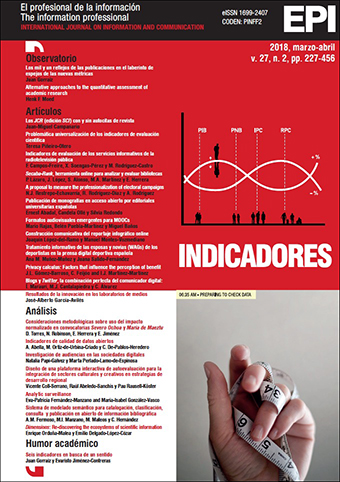The problematic universalization of scientific evaluation indicators. A critique from radio studies
DOI:
https://doi.org/10.3145/epi.2018.mar.04Keywords:
Scientific indicators, Academic accreditation, Evaluation, Research, Communicative metaresearch, Communication, Radio, Radio research, Researchers, Radio Studies.Abstract
The creation of an academic accreditation system for university researchers in Spain has led to the universalization of the pure and experimental sciences indicators. This universalization is questionable for the assessment of certain areas of knowledge such as communication science. This article provides a critical analysis of scientific evaluation indicators from a minority field of communicative research: radio studies. For this purpose, a multidimensional approach has been developed: bibliometric analysis of articles in Spanish academic journals, a survey of researchers, a study of the presence of authorities (most productive authors) in WoS-Scopus-Google Scholar, and the resolution of the main calls for national competitive fundings. The study has confirmed the inappropriate use of certain indicators -visibility and impact, internationalization, cooperation, or funded projects- for the evaluation of Spanish radio research, even more adverse than their use in other areas of communication. The adoption of mixed systems that make it possible to better evaluate the real impact of radio research is proposed.
Downloads
Downloads
Published
How to Cite
Issue
Section
License
Dissemination conditions of the articles once they are published
Authors can freely disseminate their articles on websites, social networks and repositories
However, the following conditions must be respected:
- Only the editorial version should be made public. Please do not publish preprints, postprints or proofs.
- Along with this copy, a specific mention of the publication in which the text has appeared must be included, also adding a clickable link to the URL: http://www.profesionaldelainformacion.com
- Only the final editorial version should be made public. Please do not publish preprints, postprints or proofs.
- Along with that copy, a specific mention of the publication in which the text has appeared must be included, also adding a clickable link to the URL: http://revista.profesionaldelainformacion.com
Profesional de la información journal offers the articles in open access with a Creative Commons BY license.




